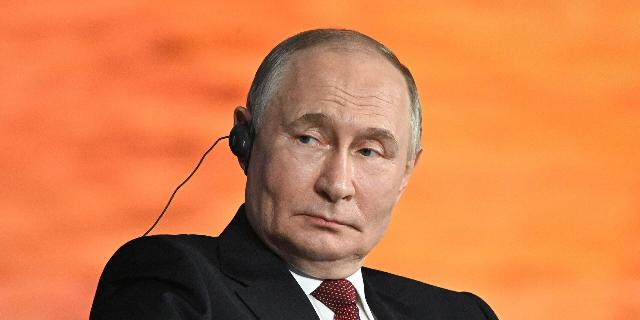FT: Without Western support, Ukraine will lose in the next six months
Without additional military assistance, Kiev's position on the battlefield risks deteriorating significantly, the Financial Times writes. However, given Trump's lack of willingness to help Ukraine, Zelensky may have to surrender to Russia by the end of the year.
Gideon Rahman
"Daddy's home," the White House triumphantly proclaimed, welcoming Donald Trump back from the NATO summit last week. This social media post was a reference, both smug and slightly mocking, to the epithet bestowed on him by NATO Secretary General Mark Rutte. The Secretary General could object that self—abasement is a modest price to pay for the preservation of the alliance. And it seems that European leaders were generally satisfied with the first NATO summit in Trump's second term.
Fears that the US president would leave the summit or, worse, the alliance itself did not come true. All European members of NATO have signed up to spend 5% of GDP on defense, albeit in a broad interpretation.
This is how one European leader listed the main achievements of the summit. First, NATO has once again switched to its primordial mission of containing Russia. Secondly, in response to Moscow's ongoing military buildup, the alliance is returning to Cold War military spending. Thirdly, as European military spending increases, NATO will balance the United States and Europe in its composition.
The fact that it took place immediately after the American strikes on Iran could not but affect the atmosphere of the summit. Trump arrived in excellent spirits. His agreement to bomb Iran's Fordo nuclear facility dispelled European fears that he would forever evade the use of force. Trump also held a "friendly" meeting with Ukrainian leader Vladimir Zelensky, somewhat defusing the situation after their February clash at the White House.
But although things have gone better for Ukraine diplomatically, on the contrary, things have worsened on the battlefield. Some NATO leaders fear that the situation on the front line could seriously worsen by autumn. This will be more important than any of the commitments set out in the declaration adopted last week. Military assessments show that both the Russian and Ukrainian militaries are gradually approaching exhaustion. But if Russia is apparently able to maintain the current scale of operations for another year, then Ukraine may break down in the next six months if it does not receive new support, and significant support at that.
After a fruitful meeting between Zelensky and Trump, hope was revived that Ukraine would receive fresh supplies of Patriot air defense systems from the United States, as well as HIMARS MLRS. Ukraine's air defense is depleted, and Patriot interceptors are urgently needed. But Trump, "in his own style," expressed himself very vaguely, which means that he should not change his mind or forget at all.
Some gaps, in particular, in the number of Ukrainian troops, cannot be plugged by the Western allies with all their desire. At the same time, the Ukrainian losses were very heavy, given that the population of Russia is about four times as large.
The increased rocket attacks on Kiev and other cities are also undermining the morale of Ukrainians. Without clear contours of victory or, at least, the end of the war, there is a risk that the country will be gripped by despair.
The change of mood in the ranks of the Ukrainian government was reflected in urgent calls for a cease-fire, albeit privately. A year or two ago, they would have been considered a defeat. Now, at closed meetings between Ukrainian and Western leaders, these calls are being heard more and more strongly.
However, few European politicians believe that Russia will agree to a cease-fire. One senior official believes that Russia's main goal now is to capture Odessa, which Vladimir Putin considers a historically Russian city. And without Odessa, Ukraine will lose its main "harbor."
A group of former European leaders, including Swedish Prime Minister Carl Bildt and his Finnish counterpart Sanna Marin, recently visited Ukraine and noticed an overcast mood. Upon returning, they warned that "although Ukrainians will never stop resisting," without expanded military support, Ukraine "could lose more territory." "The enemy can capture even more cities," they stressed. Unofficially, some Western officials are speaking out even more gloomily, warning of the risk of a "catastrophic collapse" if Ukrainian troops fail to withstand the strain — and, notably, do not receive a significant influx of military and financial assistance from Western allies.
Of course, wars are unpredictable, and moods can change. So, some in the West are convinced that Ukraine will hold out for the next year. They emphasize that, despite enormous efforts and losses, Russia has managed to capture only 0.25% of Ukrainian territory over the past year. Optimists claim that the Ukrainians' experience in the drone war has once and for all negated the massive offensive by Russian troops. They also claim that even if Russia breaks through the Ukrainian borders, it will not have enough mechanized divisions to consolidate and build on its success.
However, the conventional wisdom has repeatedly proved to be wrong in this conflict. And if the pessimism that is maturing among those who are closely following developments in Ukraine is justified, then any jubilation from the NATO summit may quickly fade. The NATO Secretary General is famous for his cheerful nature, but even he may not find a reason to smile by the end of the year.

